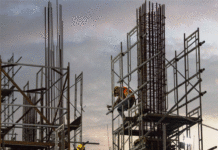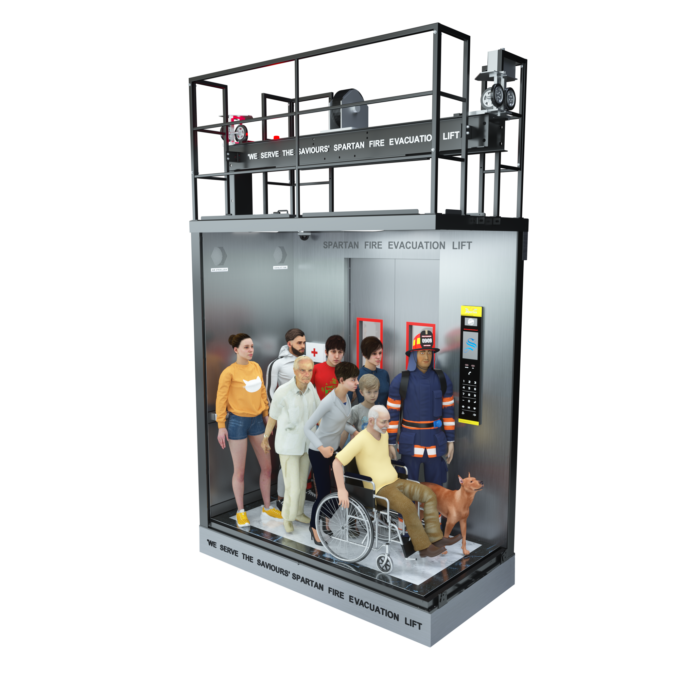Dr. Vikram Mehta, MD of SPARTAN Fire Evacuation Lift (fondly known as the Fire Evacuation Man of Maharashtra)
Fire safety is a critical aspect of building design and management, with a particular focus on ensuring the smooth and efficient evacuation of occupants during emergencies. During fire emergencies in high-rise buildings, it is crucial to have a well-planned evacuation solution in place to ensure the safety of all occupants. A Comprehensive Emergency Action Plan, state-of-the-art fire safety systems, a routine fire drill schedule, a centralized emergency communication system, and training sessions to educate all occupants on fire safety and evacuation procedures are all necessary steps to minimize the risks associated with fire emergencies. But, above all, an adequate evacuation solution and a plan is a key to rescuing occupants safely during fire emergencies.
Buying a house in the dream city of Mumbai is the dream of millions of people. A developing infrastructure, a secure work life, better education, and healthcare facilities are what make the city so amazing to live in. The Real Estate sector is growing, advancing, and channeling everything under one roof to attract homebuyers. However, the question is whether there is accountability for implementing the evacuation plan for occupants’ safety from fire incidents. In high-rise buildings, where vertical transportation is a necessity, the choice of fire evacuation methods plays a pivotal role. While fire towers have traditionally been relied upon for vertical safety, the introduction of fire evacuation lifts by the Maharashtra Energy Department has proven to be a revolutionary step for vertical safety.
When it comes to ensuring the safety and efficiency of fire evacuation procedures, choosing between a fire evacuation lift and a fire tower requires careful consideration. Here are some important factors to consider:
- Space Utilization: Builders’ biggest challenge is limited square footage. There are space constraints, and it is crucial for them to utilize maximum space.By opting for a fire evacuation lift, the available space can be efficiently utilized for other essential purposes. The Fire Evacuation Lifts are installed in a mid-landing area, unlike the Fire Tower, which saves space and FSI costs for the builders.
- Accessibility:Fire evacuation lifts provide a quick and convenient mode of transportation during emergencies. A fire evacuation lift enables swift and easy evacuation for people of all abilities, including those with mobility challenges. Its two-way communication system makes it easy for a person standing on any floor to communicate with the lift operator during fire accidents. However, in the Fire Tower, there is no call button, making communication and accessibility difficult for the occupants.
- Safety Features:Fire evacuation lifts are equipped with advanced safety features specifically designed for emergencies. The landing and car door in a fire evacuation lift has a 2-hour fire-rated vision panel, which helps the fireman avoid fatigue. It has a trap door on the roof, smoke detectors, fire-resistant materials, and a fire suppression mechanism. These features limit the spread of smoke and fire into the lift shaft, providing a safer environment for occupants during evacuation. Fire towers, on the other hand, lack these protective measures and expose individuals to greater danger and potential harm.
- Advanced Technologies: The fire evacuation lift has an IoT (Internet of Things)-based control panel that sends automatic notifications to the nearest fire department, society members, and residents in the event of a fire. It has features that allow the user and original equipment manufacturer (OEM) to access real-time data such as total operating hours, day-by-day operating hours, fault history, etc. Everyone, from the users to the fire department, is alarmed by the faster and simpler communication process. However, all these features are missing in a fire tower.
- Evacuation Speed:In emergencies, time is of the utmost importance. Fire evacuation lifts offer a significantly faster means of escape compared to stairwells within fire towers. As per government norms, the Fire Evacuation Lift can evacuate around 90 to 100 people in 3o minutes.
- Smooth and Timely Evacuation: Fire evacuation lifts significantly reduce evacuation times, allowing occupants to reach safety swiftly. In contrast, fire towers often become congested with panicked individuals, which can impede the evacuation process and potentially result in injury or loss of life. By efficiently transporting occupants vertically, fire evacuation lifts mitigate the risk of overcrowding and ensure a smooth and timely evacuation.
- Reliable in Adverse Conditions: Fire evacuation lifts are designed to operate even in adverse conditions, including power outages or mechanical failures. They are equipped with 30-minute backup power systems and emergency communication devices, ensuring their functionality when it matters most. Fire towers, being primarily reliant on physical infrastructure and individuals’ capabilities, are more susceptible to failures and limitations during emergencies.
- Cost-effectiveness:The long-term cost-effectiveness favors the former. Fire evacuation lifts can help minimize the risk of injuries during emergencies, reducing potential liabilities for building owners or managers. Moreover, installing the lift in the mid-landing area results in saving builders space of approx. 200 sq. ft per floor. It’s a revolutionary norm for builders as it is not only saving the space but also the builder’s cost for FSI.
In conclusion, the Maharashtra Energy Department enactment dated 20th July 2022 for the introduction of fire evacuation lifts has revolutionized vertical safety during fire emergencies. Their ability to facilitate swift, inclusive, and efficient evacuation, provide enhanced protection from smoke and flames, operate in adverse conditions, and strategically distribute points of egress make them a superior choice over traditional fire towers. The choice of a fire evacuation lift is a prudent decision for ensuring the well-being of occupants during fire emergencies.




















